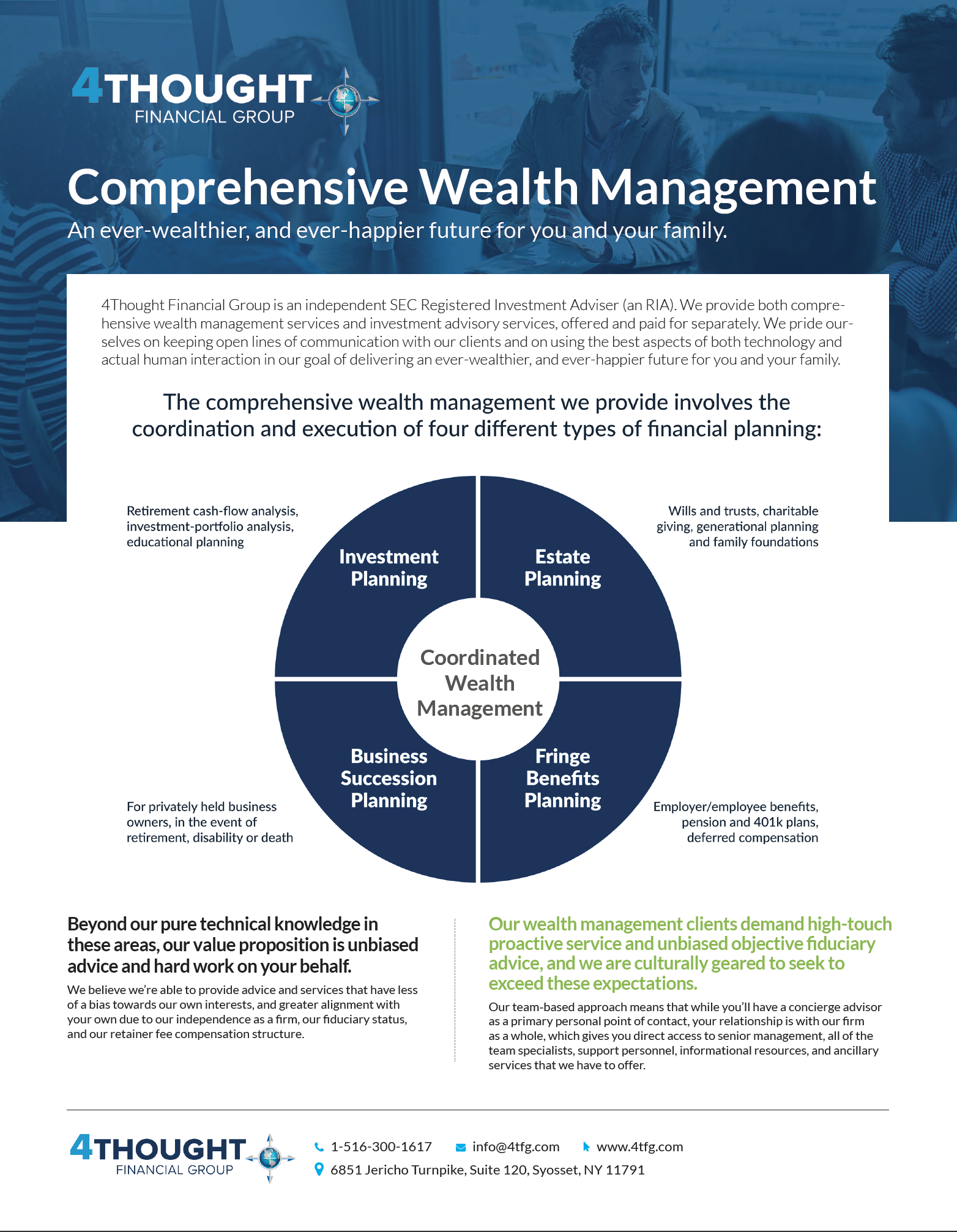

Wealth Management by 4Thought Financial Group
"The comprehensive wealth management we provide involves the coordination and execution of four different types of financial planning: Investment Planning, Estate Planning, Business Succession Planning and Fringe Benefit Planning."
Comprehensive Financial Planning – quite the austere topic. It sounds like a serious examination, or something painful. Comprehensive Financial Planning is a phrase your Investment or Financial Advisor may have thrown around at some point, or perhaps something you were told to think about. But don’t worry, it’s not as complicated as it sounds. It is a fancy way of saying, “Let’s go over your current finances and find out what areas we can help you improve on.” With that said, let’s break it down.
The Basics of Comprehensive Financial Planning:
- Savings: It all starts with Savings. If you cannot afford to save every month, then everything else will be nearly impossible. If you haven’t begun putting aside money, then start right away. The amount matters less than the discipline of doing it. Saving money is habit forming and you’ll quickly start challenging yourself to increase the amount of money you put away every month. This is the foundation of all comprehensive planning.
- Debt: This is another big one that can hamper your ability to put together a Comprehensive Financial Plan. A certain amount of debt is necessary and can even be useful at times, so don’t be afraid of carrying a measure of debt appropriate to your earning potential. Remember, even a mortgage is a form of debt, and can provide useful benefits. Conversely, paying the minimum balance on maxed out credit cards can be seriously detrimental in the short and long-term. You will find that just paying the minimum only covers the interest rate on the debt.
- Retirement Planning: This always appears at the top of our clients’ lists, and for good reason. Its’ never too early to consider what your financial picture will be upon retirement. If a retirement plan is available through your employer, it’s always a good idea to take advantage of it. This is part of the savings discipline we spoke about above. If your employer offers matching of any kind, it’s a bonus. If this isn’t available through your employer, then consider speaking to a financial advisor about an Individual Retirement Account (IRA). Once again, it’s not the amount that matters in the beginning, it’s the process. There are other tax benefits when utilizing a properly founded IRA, so be sure to speak to your financial advisor about this. Retirement planning is one of the areas that 4Thought Financial Group specializes in so we’re happy to answers any questions you might have.
- College: This always seems to be number two on the list and unfortunately, with the cost of college today, many people dip into retirement accounts to help with college savings. If you have children who are college-bound, you must consider a separate, yet coordinated plan to account for this expense. Even the most affordable community and state colleges have costs outside of tuition that should be considered. Remember, it’s not just about tuition; kids enrolled in full-time college still need to purchase books and supplies. And we all know how much they can eat! Even if your child works part-time during college, it’s nearly impossible these days to get by without incurring costs and potentially taking on more debt. The more you can alleviate your children from the future burden of college debt, the better off they will be when they enter the real world. (And the better the chance they won’t land back on your couch!) Believe it or not, saving for college is something you should think about before your children are even born. Having said that, it’s never too late to start saving.
Intermediate Levels of Comprehensive Financial Planning
- Will: It is often such an overlooked thing, but if you have loved ones, this is so important. Unfortunately, life is unpredictable. Preparing a will not only makes it easier for loved ones to sort your affairs, it provides you with peace of mind in the process. You do not have to be rich to have a will. After all, the value of an object is always in the eye of the beholder. It also doesn't always have to be about money.
- Insurance: There are many different types of insurance including life, disability and medical. The most basic of all insurances to protect you and your loved ones should be some form of life insurance. Also overlooked many times is long term disability insurance. When people are young, they tend to believe they’re invincible. And yet, accidents Moreover, you do not have to be physically disabled to qualify in certain instances as health related issues are often covered with the right policy. Rates for policies such as these can be extremely affordable when you’re young.
Advanced Levels of Comprehensive Financial Planning
- Estate and Tax Planning: Estate and Tax Planning fall into the category of a will, but tend to be more involved, with potentially setting up of trusts. For clients who are financially secure or have amassed a comfortable level of wealth, 4Thought advisors work closely with attorneys and accountants to ensure holistic financial planning measures are in force at all times.
- Senior care: Assisted living and nursing home care are expensive today, which means you need to start planning when you are young. In many cases, our clients aren’t simply planning for their own future, but for their parents as well.
- End of Life Care: Death and taxes… as the saying goes. End of life care has become one of the most expensive and wealth-draining periods in American life. If you have not already thought about paying for the burden of end of life care and funeral costs, do so. Not only does it make prudent financial sense for you and your heirs, it’s one less thing for your loved ones to worry about during a time of mourning.
As you can see, there are different levels of a Comprehensive Financial Plan depending on your circumstances. Age, income, dependents, assets – these are all factors that financial advisors take into consideration when creating a custom wealth management plan to suit your financial goals. While it’s certainly a relief to have a comprehensive plan in place, it’s important not to “set it and forget it.” While you don’t have to pour over your plan on a regular basis (that’s your advisors job) it is important to update your plan every few years as life changes. New grandchildren, investment performances, gains on the sale of assets are all events that can impact your financial plan. And what wonderful events they are.






Leave a Comment